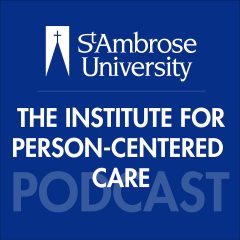Transforming Behavioral Health Care: The Power of Collaboration and Tech
- Transforming Behavioral Health Care: The Power of Collaboration and Tech 1:05:46
Transforming Behavioral Health Care: The Power of Collaboration and Tech
Description:
Join two leading experts in behavioral health as they dive into the pressing issue of the growing demand for mental health services versus limited access to equitable care in the United States. Discover how the Collaborative Care Model serves as a powerful framework to seamlessly integrate mental health services into primary care, with a focus on expanding access in rural communities. The conversation also explores innovative digital tools that can streamline care coordination and boost patient outcomes, paving the way for a more connected and efficient approach to mental health care.
Objectives:
- Explain the factors contributing to the growing demand for mental health services.
- Discuss how the Collaborative Care Model can enhance mental health outcomes in various settings while supporting the Quadruple Aim.
- Discuss the role of digital tools in enhancing care coordination and improving patient outcomes within behavioral health services.
Guests:
Luke Raymond
Sarah Oliver, PhD, MSW
Bios:
Luke Raymond
Luke Raymond is an accomplished leader in behavioral health strategy, operations, and innovation, with over 20 years of experience in the field. A therapist by training, he has spent time in various clinical, strategic, and commercial leadership roles with a strong focus on improving access to care, reducing costs, and delivering effective outcomes. Luke co-authored an article in Psychiatric Times on implementing telepsychiatry in rural settings and has spoken at numerous national conferences, including the Healthcare Information and Management Systems Society (HIMSS), the American Telemedicine Association (ATA), and American Health Insurance Plans (AHIP). Luke has both commercialized and led initiatives that resulted in a 50% reduction in emergency department visits, improved patient and clinician satisfaction and delivered effective digital and virtual care at scale. Luke is certified in trauma-focused cognitive behavioral therapy and integrated primary care therapy. His clinical interests include ADHD, anxiety, and trauma recovery. Luke lives with his wife and daughter in central Illinois, where he enjoys endurance running, fishing, and bourbon outside of work.
Sarah Oliver, PhD
Sarah has nearly 30 years of experience in the social work field as a case manager and psychotherapist. She specializes in working with individuals who have experienced trauma. She earned her PhD in Clinical Social Work with a specialization in military and veterans issues and previously earned her MSW degree in Social Work from the University of Iowa.
Sarah is the Director of Counseling at St. Ambrose University in Davenport, IA, and has worked with the college-age population for the last eight years. In addition, Sarah has a private practice where she sees Veterans and first responders who have experienced combat and other forms of trauma.
Sarah is no stranger to Veterans or Veterans issues, having spent 17 years as a Clinical Social Worker for the Iowa City VA Health Care System. During this time Sarah had specialized experience providing care to Homeless and at-risk Veterans and providing psychotherapy to Veterans. She has been in a variety of front-line social work and leadership roles coordinating with community members and other interested groups to provide the best care to Veterans.
In addition, Sarah has taught as an Adjunct professor at the University of Iowa’s School of Social Work for 16 years.
References
American Foundation for Suicide Prevention Suicide Statistics, 2024 https://afsp.org/suicide-statistics/
World Health Organization, COVID-19 pandemic triggers 25% increase in prevalence of anxiety and depression worldwide, 2022
KFF, KFF/CNN Mental Health In America Survey, 2022 https://www.kff.org/mental-health/report/kff-cnn-mental-health-in-america-survey/
American Psychiatric Association Workforce Development, 2024 https://www.psychiatry.org/psychiatrists/advocacy/federal-affairs/workforce-development
Health Resources & Services Administration Workforce Projections, 2021 (Source)
National Library of Medicine, Understanding the expanding role of primary care physicians (PCPs) to primary psychiatric care physicians (PPCPs): enhancing the assessment and treatment of psychiatric conditions, 2010 https://pmc.ncbi.nlm.nih.gov/articles/PMC2925161/
National Library of Medicine, Rural-urban prescribing patterns by primary care and behavioral health providers in older adults with serious mental illness, 2022,
CMS Medicare Learning Network Bulletin (Source) 9-AIMS Center, Evidence Base for Collaborative Care (CoCM), https://aims.uw.edu/evidence-base-for-cocm/
National Library of Medicine, From Triple to Quadruple Aim: Care of the Patient Requires Care of the Provider, 2014,










